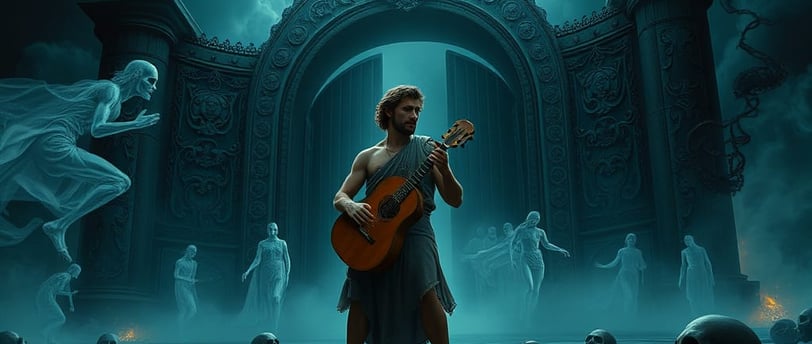Orpheus and the Second Descent: A Tale of Grief and Defiance
Orpheus, the legendary musician and poet of Greek mythology
ANCIENT LEGENDS
1/28/20253 min read


Orpheus, the legendary musician and poet of Greek mythology, is known for his ill-fated attempt to rescue his beloved Eurydice from the underworld. His first descent into Hades is a tale of love and loss, where his enchanting music moved even the gods and spirits of the dead. But what if the story did not end there? What if Orpheus, consumed by grief and bitterness, ventured back into the underworld a second time? This is the story of Orpheus and the Second Descent, a lesser-known legend that explores the destructive power of sorrow and defiance.
The Return to the Underworld
The story begins with Orpheus wandering the earth after losing Eurydice for the second time. His lyre, once a source of joy and harmony, now produced only sorrowful melodies that mirrored his shattered heart. Mortals and gods alike avoided him, for his music no longer inspired; it mourned.
One night, as Orpheus played his lyre beneath a pale moon, he felt the pull of the underworld once more. The boundary between the living and the dead seemed thinner than ever, as if beckoning him. He resolved to return to Hades, not to plead for Eurydice’s return, but to confront the gods themselves and challenge the natural order.
A Song of Defiance
As Orpheus crossed the Asphodel Fields, the shades of the dead gathered to hear his music. Unlike before, his song was not one of love or longing but of rage and defiance. The mournful notes resonated through the underworld, shaking its foundations. The spirits wept, not from sorrow but from the raw power of his grief. His music threatened to unravel the delicate balance of the realm.
Hades, the stern ruler of the dead, emerged from his dark palace, accompanied by Persephone, the queen of the underworld. They stood before Orpheus, their expressions a mix of anger and pity.
“Why have you returned, mortal?” Hades demanded. “You defied our trust once and failed. What do you hope to achieve now?”
Orpheus met the god’s gaze with unflinching determination. “If I cannot have Eurydice, then let your realm know my pain. Let it crumble beneath my song.”
The Wrath of Hades
Orpheus’s music grew louder, each note piercing the air like a blade. The rivers of the underworld churned, and the walls of Hades’ palace trembled. Even Persephone, moved by the intensity of his grief, urged her husband to intervene.
Realizing the danger Orpheus posed, Hades raised his hand and unleashed his divine power. A deafening roar filled the air as Orpheus was cast out of the underworld. His lyre shattered in his hands, its strings snapping like threads of fate. The echoes of his song lingered briefly before fading into silence.
The Aftermath
Orpheus awoke on the mortal plane, his body bruised and his spirit broken. Without his lyre, he wandered aimlessly, a shadow of his former self. Yet, some say his final notes remained in the wind, faint and sorrowful, carrying the story of his defiance to those willing to listen.
In the end, Orpheus’s second descent was not a tale of triumph but a cautionary story about the destructive power of unchecked grief. His defiance of the gods serves as a reminder that even the most gifted among us are not immune to the consequences of their actions.
Legacy of Orpheus
The story of Orpheus and the Second Descent may not be as well-known as his first journey to the underworld, but it adds a new dimension to his character. It portrays him not just as a tragic lover but as a man consumed by sorrow and rage, willing to challenge the divine order itself. His tale resonates with themes of loss, defiance, and the fragile balance between creation and destruction.
Orpheus’s story continues to inspire art, music, and literature, reminding us of the enduring power of myth. Whether as a cautionary tale or a reflection on the human condition, his second descent into the underworld remains a haunting chapter in the rich tapestry of Greek mythology.
Did you like this article?
Thank you for your support!
Every donation helps us create more engaging content, improve the quality of our stories, and dive deeper into the fascinating worlds of ancient legends, historical mysteries, and folklore. Your contribution fuels our creativity and allows us to share these captivating tales with a wider audience.
Together, we can bring these myths and stories to life! 🙏✨
© 2025. All rights reserved.
You may notice "Buy Me a Coffee" links throughout this site. These links allow readers to support our work and help us maintain this platform. By relying on contributions from our audience, we aim to avoid intrusive advertisements, ensuring a cleaner and more enjoyable reading experience for you.
Your support keeps our site ad-free and helps us continue sharing stories, mysteries, and insights without distractions. Thank you for being part of our journey!
